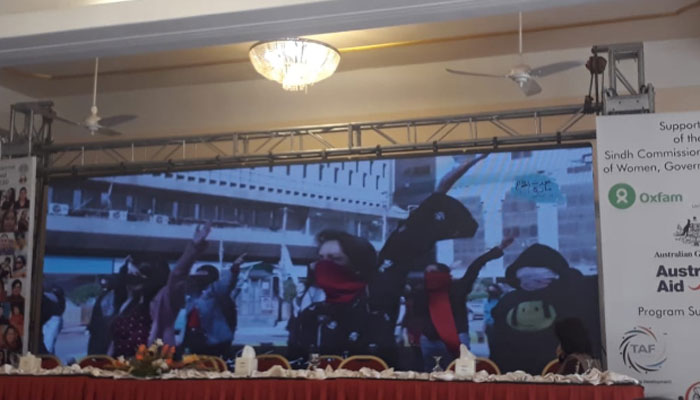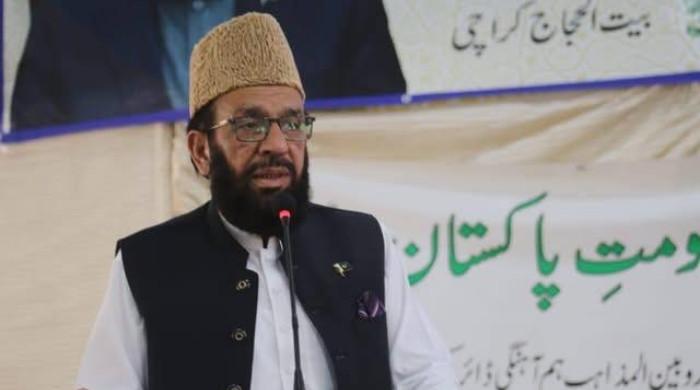National Women’s Day 2020: Karachi event discusses measures to end gender-based violence
What's the history behind the National Women's Day?
February 13, 2020
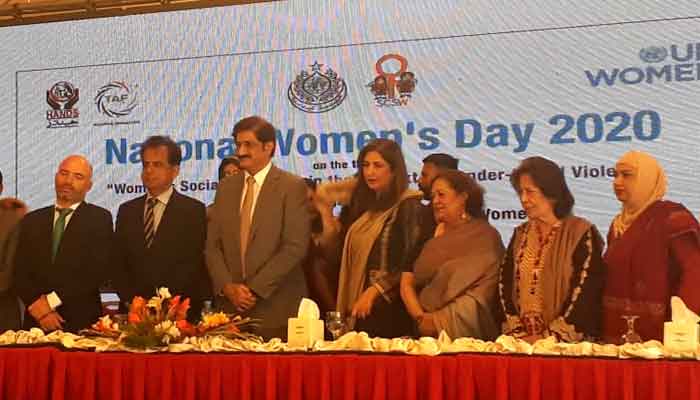
Unbeknownst to the majority in Pakistan, February 12 is celebrated as National Women’s Day, where women from every working sector of Pakistan are acknowledged on the basis of their accomplishments and vision.
The Sindh Commission on the Status of Women, along with United Nations Women (Pakistan chapter) and the Australian High Commission among others, held a day-long event at Karachi’s Beach Luxury Hotel to commemorate the day by celebrating the achievements of women across the country.
The event, based on the theme of ‘Women’s social protection in the context of gender-based violence’, discussed various socio-legal measures taken by the Sindh government and NGOs to elevate the status of women in society.
History of Feb 12th
The day, like every other day marking an important event, has a history to it.
As highlighted by moderator Raheema Panhwar and later by Anis Haroon, women realised during former military dictator Zia-ul-Haq’s tenure that they needed to fight against laws that adversely impacted women and minorities.
“In Lahore, Asma Jahangir, Hina Jillani and Women Action Forum members took out a rally to present a petition to the high court on the laws leading to injustice against women,” narrated Anis Haroon.
She recalled that, during martial law, rallies were banned. “The protesters had barely crossed the road to reach the court when they were baton-charged,” she remembered, adding that all of those people were taken to Kot Lakhpat jail.
“When we held a protest at the Quaid’s mausoleum in Karachi against what had happened in Lahore, we weren’t exactly beaten, but the molvis said participating in the protest had nullified our nikkah,” Haroon recalled, drawing gales of laughter from the audience.
She recalled when, almost a decade earlier, while she was chairperson of SCSW, then prime minister Yusuf Raza Gillani had suggested that if International Women’s Day is celebrated on March 8th, then February 12 should also be commemorated as the National Women’s Day to honour the resilience of women in Pakistan.
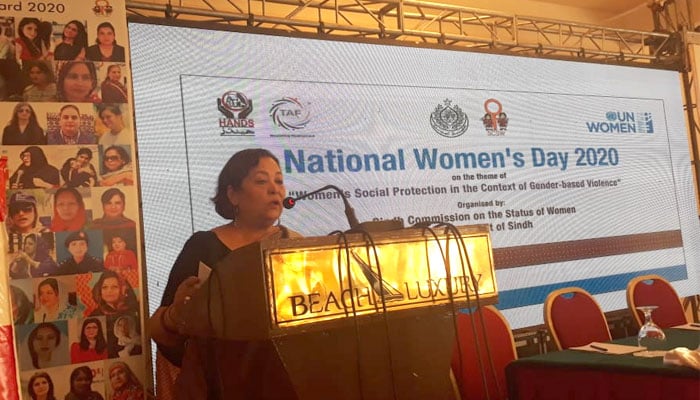
'We believe in working hard'
At the beginning of the event, SCSW Chairperson Nuzhat Shirin addressed the crowd, saying that the commission under the Sindh government has entered its third year.
Describing celebrating National Women’s Day as a tradition, Shirin said: “We don’t cry over issues, we believe in working hard.”
Defining the objective of the organisation, she said that it was formulated as an ‘overseeing body’ to ensure that there is no discrimination towards women in workplaces.
“After every visit to a place, a report is forwarded to the chief minister and our recommendations are paid heed to,” she added.
The sessions also included small, yet heartening success stories of women who achieved financial independence through sheer power of will.
One such tale concerned a young boxer from Lyari, while another was about a girl who continued her clothing business and also progressed steadily in her career in marketing.
'Lot more to achieve'
Chief Minister Sindh was the chief guest at the event, where he awarded prizes to women over notable achievements and also delivered a small address.
While congratulating the commission on holding the event, he spoke on the measures taken by the Sindh government on women empowerment.
“A lot yet remains to be achieved,” he said as he spoke about the plans.
Attributing the Sindh government’s vision of female empowerment to the late Benazir Bhutto, the CM said that important legislation has been enacted to ensure better protection of women.
As for future legislation, the Sindh government is working on the Early Marriage Act and rights of agricultural women workers in farms, he continued.
“Women constitute more than 50% of the population. Unless we empower them properly and they help them play their role in the development of the nation, we cannot progress,” the chief minister said.
Sufficient protection for women
Sindh Minister for Women Development Syeda Shehla Raza was also present at the session, where she spoke during the session 'Role of the Women Development Department in the upliftment of women in Sindh’.
“This is also violence that a powerful person at home intimidates the weakest individual even by glaring at them. They [women] can even lodge a complaint against this [intimidation of this nature],” said the minister.
She said that in such cases, even if an SHO is present at a police station, they are required by law to take immediate action.
Dividing the issue into three parts — legislation, prevention and response — Raza said that the women department provides legal and health assistance free of cost.
The minister claimed that the Sindh government ranks among the top 10 across the world for public-private partnership. “After Bibi’s (Benazir Bhutto) passing, we provided around 65 lakh jobs,” she said.
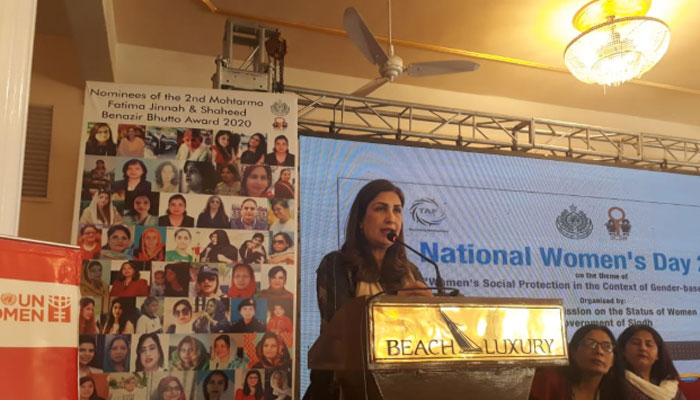
Speaking on the BISP, Raza said: “You can change the name of the programme. Do the work too, surely, but deliver as we did”.
Reporting and surviving trauma
Dr Summaiya, a medico-legal officer, discussed the medical aspect of domestic abuse and rape cases. Introducing herself as the Additional Police Surgeon working since past 20 years in Karachi, she said that in her experience, the ratio of actual cases to those reported is 5:1.
Elaborating the ratio, she said that it is likely out of five only one woman comes to her for medico-legal checkup or formalities. “When such cases get prolonged and money runs thin, the support system against the victim starts fading,” she said.
She said that providing basic protection to the victims is essential, proudly adding that the department has picked up pace on the matter and recruited up to 15 women MLOs within three months.
During the session, panellists also emphasised education and skills-based knowledge to fight gender-based violence.
The panellists said men should also sensitised so that they can understand the struggles of women.
“We aren’t the enemy of men, society comprises them too. If there is a balance in society then gender-based violence will also end”.
Dr Asha Bedar, while speaking on working with the trauma of violence, said that trauma is impacted by conditioning during childhood.
“Moving a survivor is not enough: there should be rehabilitation involved,” she stated, adding that counsellors should accompany women whenever they lodge a complaint or choose to speak of their ordeal.
The event also included powerful performances by children on gender-based violence, award distribution and dance performance.
